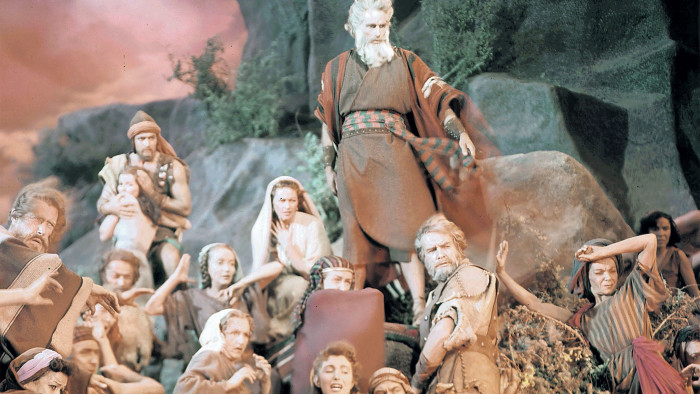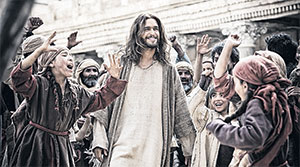From Noah to Moses, why the renewed interest in Bible films?

Simply sign up to the Life & Arts myFT Digest -- delivered directly to your inbox.
As far back as I can remember, Easter weekend in my Toronto household has involved Mass, new white shoes for first my little sisters and now my little daughters, and a burnished, eyebrow-rippling Charlton Heston on our TV, solemnly hamming it up as Moses for hours on end. My wife, who grew up hundreds of miles away in Milwaukee, likewise remembers Mass, ham, and Bible movies as Eastertime staples. For the Bible has been a source for movies since the earliest days of cinema – adaptations of Christ’s passion, and of the stories of Salome and of the sacrifice of Jephthah’s daughter were made in the early 1900s, while the earliest movies about the Ten Commandments and the Great Flood came out in the 1920s.
This year, however, Hollywood seems unusually interested in the Bible, and is offering several biblical releases during 2014. Son of God, released in February in the US, won endorsements from evangelical Christians and negative reviews from most film critics. And Darren Aronofsky’s Noah made its debut last month as the number one movie in America, winning both at the box office and in the (non-religious-conservative) review pages.
Later this year, Ridley Scott directs Exodus: Gods and Kings, his own imagining of the biblical account of Moses (Christian Bale, better known as Batman) leading the Israelites out of slavery. Next year will see the release of a life of Mary, along with AD, a sequel to The Bible TV miniseries. There’s even talk of a movie about Cain and Abel, involving Will Smith, and of a Pontius Pilate biopic starring Brad Pitt.
There hasn’t been this much Hollywood interest in biblical material since the last midcentury, when movies such as Quo Vadis (1951), The Robe (1953), The Ten Commandments (1956), Ben-Hur, Solomon and Sheba, The Big Fisherman (all released in 1959), and King of Kings (1961) came out to popular and critical success, establishing what we now expect from Bible movies: that they be outsized spectacles of event and feeling, frequently melodramatic, and occasionally lurid, but usually respectful of their source material.
At least, they certainly claimed to be. Mindful of the commercial implications of offending tens of millions of middle-class American churchgoers seeking nourishing entertainments, the trailer for King of Kings gravely explains that, in casting Jesus, “Jeffrey Hunter, [a] young American actor, was chosen because of his rugged strength, personal integrity, and the humility and devotion with which he regarded his role”. It’s difficult to imagine a contemporary trailer making this set of claims for why Christian Bale is playing Moses.
Market opportunism is clearly one of the factors informing Hollywood’s latest come-to-Jesus moment. There are about 80m conservative evangelical Christians in the US alone. To be sure, these muscular believers have long been a presence in American life, if not with as much self-aware and highly organised political influence and cultural clout as they have come to possess in recent decades; in no small part, in fact, because of Hollywood’s behaving badly at times with the Bible.
Most notably, Martin Scorsese’s The Last Temptation of Christ (1988) depicted Jesus dreaming of sex and marriage with Mary Magdalene while dying on the cross, among other aggressive departures from the Gospel accounts. It met with concerted protests from conservative Christians, which significantly contributed to its commercial failure.
Today, if mega-church pastors endorse a movie from their gleaming pulpits, the members of those mega-churches will hand over their money at the cinema. Son of God has enjoyed just this kind of advantage, with its emphasis on fidelity to the Gospel accounts mirroring a fidelity to the way in which evangelicals experience their faith. With an incessantly heavy violin score punctuated by thunderclap sound effects, Son of God conveys gravitas and pathos with an emotional directness and dramatic eventfulness very much in keeping with evangelical expectations of meaningful religious experience.

Noah, however, is very much not in keeping with these expectations, and yet it is a critical and commercial success, at least in countries where it is allowed to be shown. That it will soon be followed by new biblical epics with fantasy realm titles such as Exodus: Gods and Kings, suggests a shift in the Bible’s place in our cultural lives, more so than the continued church-friendly success of movies such as Son of God.
Indeed, Pope Francis love-fests aside, first world culture is now staggeringly self-confident in its secular ethos: its thinkers, tastemakers and film-makers have become so far removed from the particular truths, the histories and genealogies, and the moral propositions housed within the Bible, there’s no longer any reason to treat the Bible as a sacred text, whether out of respect, or to attack it, or to shock its holdout adherents.
In other words, we seem to have reached a moment when the Bible is becoming a grand and rich storehouse of fantastic, ethically charged stories liberated from the responsibilities, risks, and demands that come of two millennia of globe-spanning belief in the book as the sacred writ of God. Instead, films such as Noah suggest the Bible’s status as an untapped source of amazing mythology, teeming with striking figures and stark tales just waiting to be remade by technologically advanced, self-affirming non-believers equipped with their own notions of good and evil.
Aronofsky’s version of Noah takes its story from Genesis 6, where we hear of God’s decision “to wipe out the human race [He] created from the face of the earth” because of its “perpetually evil” ways. To start afresh, God asks a man named Noah, “a righteous man”, to build an ark to house his family and two of every living thing. “And this Noah did; as all that God commanded him, so he did.”
Aronofsky depicts Noah as a peaceable vegetarian who, with his wife and sons, leads a slow life in harmony with the pretty flowers. The rest of antediluvian humanity roils around them, violent cannibals who ransack and ruin the earth for industrial gain, at least until the rains come down. They all perish while the righteous man and his family and two of every animal escape aboard the ark. Noah and company are aided in their effort by a CGI race of giant stone angels – the Watchers – who have more in common with the wise walking trees and chivalric robots of The Lord of the Rings and Transformers franchises than they do with their ostensible biblical source, a race of semi-divine beings who walked the earth long, long ago.
In spite of their great granitic efforts, a bad guy stows away on the ark – a Game of Thrones-worthy king, likewise very loosely based on a minor Old Testament figure – who then squares off against Noah in a totally unbiblical, if entirely conventional, action movie sequence, complete with ironic one-liners and predictable poetic justice. Anathema to biblical traditionalists, Noah as tough-talking eco warrior is easy edification-cum-entertainment whether you are a morally minded progressive or a mindless action movie fan. This is largely why the movie is doing well at the box office and in the review columns. As the movie version of Noah plays out, however, it becomes ever more moralising, not only about the virtues of whole grains and vegetables over meat and war but about the nature of religious commitment itself.
Indeed, after dispatching the movie’s main villain, Noah becomes a villain himself, emerging as a fatalistic and self-loathing believer, in open conflict with his loved ones because of the rigidity of his devotion to God’s plans for the destruction and renewal of the world. This fatalistic conviction turns Noah into a ship-bound egotistical tyrant who threatens his very family – because this is what God wants him to do. So rendered, the character becomes a perfect example of an astonishingly self-assured secular imagining of the dangerous and deadly extremes you can go to when you believe in God and try to obey His commands.
With new Hollywood Bible movies ahead, it remains to be seen just how prophetic Noah proves in approaching the Bible as no more than a grand source of ancient Middle Eastern myths that are now ripe for digital, late secular manipulations. In the meantime, it provides a perfect Eastertime movie for 21st-century non-believers. It’s preachy, affirming and consoling on fashionably progressive terms, and it’s also far more sophisticated in its special effects than those silly old Bible movies from the 1950s – just as they probably said in the 1950s about those silly old Bible movies from the 1920s.
Randy Boyagoda’s new novel ‘Beggar’s Feast’ is published by Viking UK and Pintail US. His biography of Richard John Neuhaus, the Catholic priest and neoconservative intellectual, will be published in 2015
——————————————-
How to make money and influence people

Some call it a sign from God. Others, a shrewd calculation by Hollywood, writes Emily Steel.
Either way, building buzz – and even brouhaha – for Bible-based films among churchgoers can pique the curiosity of broader secular audiences. Movie studios are busy repackaging stories from the bestselling book of all time – there are about a dozen Bible-based films in the works this year. The hope is that they can attract both the lucrative faith-based audience (about 80m US evangelical Christians are estimated to have about $2.1tn in annual disposable income) and the wider filmgoing public.
With the release of The Passion of the Christ 10 years ago, Hollywood discovered that a previously untapped market of Christians would sell out cinemas if producers told Bible-themed stories in an approach in line with their beliefs. The $30m film, financed by Mel Gibson, grossed more than $600m worldwide and topped the 2004 box office chart.
Larry Ross, a publicist who worked with Gibson to market The Passion of the Christ, says: “When you are telling the story that is the foundation of faith for two-thirds of the planet, it makes sense to appeal to that affinity market but, of course, with these films the box office success comes when the faith community primes the pump on the opening weekend for mainstream audiences to follow.”
In the decade since Gibson’s film triumphed, few Bible-themed movies have scored such box-office success. This year, however, the entertainment industry is testing the waters, both with smaller productions such as Son of God targeted specifically at religious groups and mega-productions such as Noah, the first Hollywood Bible epic in almost 50 years, seeking broad appeal.
Son of God, adapted from Mark Burnett and his wife Roma Downey’s popular US cable television miniseries The Bible, was produced with a trim $20m budget for the film version, which has grossed an estimated $59m to date in the US. The movie, distributed by 20th Century Fox, has received lacklustre critical reviews but broad support among churchgoers. It is now having an international rollout.
Burnett is the British-born producer behind the TV series Survivor and The Voice, and on Son of God he deployed the buzz-building tactics he uses to promote his popular reality television shows. First, producers assembled a team of more than 40 advisers across Christian denominations to review the script and invited some of them to see filming in Morocco.
By the time the film came out, those people were emotionally connected to the movie, pre-booking multiplexes in at least 10 cities to play the film on all screens.
Joel Osteen, an American preacher and televangelist whose non-denominational Lakewood mega-church in Houston draws an average of 43,500 attendees each week, was one of those who reviewed the script for Son of God and visited the film set. He has encouraged his followers to see the film and says that he is promoting it as a tool to share his faith: “A lot of people won’t go to a church. They are not going to listen to a TV preacher like me but they will go to a movie and see what we are talking about.”
There was also a live The Bible: Son of God concert tour in 16 cities across the US, with tickets priced from $30 to $130. There are linked materials for Bible study and integrated video clips from the series in a popular Bible app, YouVersion.
Indeed, the flood of Bible-related movies comes as technological developments change the ways in which people interact with Bible stories. More than 35m people in the US visit a religious website or mobile app each month, according to measurement company ComScore. There are more than 300 Bible apps, and users spend an average of 91.6 minutes a month exploring them, about the same amount of time as people spend with news apps, according to mobile tracking group Flurry.
On an altogether different scale, Paramount Pictures’ epic Noah starring Russell Crowe, Jennifer Connelly and Emma Watson, was produced with a $130m budget and has so far made almost $250m in worldwide box-office sales since opening in late March.
Rich Gelfond, chief executive of cinema group Imax, says: “Can these films break out of their historical niche? I think we’ll find out with Noah.”
Emily Steel is the FT’s US media and marketing correspondent
Comments